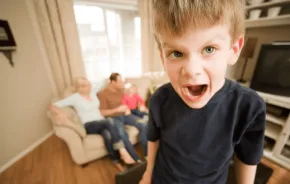
On February 17, 2017, I got a phone call from my internist. As she told me I had a tennis ball-sized mass in my frontal lobe, my two young sons attempted to climb my legs and begged I read them stories. But their usually playful tone turned to desperation once they saw mine. Even my 1- and 4-year-old boys knew this wasn’t a typical phone call.
A week later, I had brain surgery. A week after that, I learned my tumor, now removed, had been the most aggressive form of brain cancer, called a glioblastoma. I was a 33-year-old mother with two beautiful sons and I had a year to live. My youngest, I realized, wouldn’t even remember me when I died.
I’ve always described my kind of mothering as a willingness to “turn myself inside out” for my kids. I meant this as a metaphor for intimacy, openness and commitment, but my diagnosis put it the test.
Being present after a terminal diagnosis is challenging. It’s more comfortable to slide into self-pity, to disconnect from life. But to step aside was, I knew, to disappear earlier from life.
“If I have a year to live, do I want my kids to see me dying in front of them or truly living as the mother they recognize?” I asked myself.
It’s not that my kids didn’t know I was sick. My husband and I talked about it openly. Cancer was at our dinner table, in the brain of my eldest son’s favorite stuffed animal and the topic of conversation at preschool. But I refused to let it define me or what I knew could be my legacy, so I continued.
Just as I continue now — a year later, with clean scans.
For me, mothering from a place of terminal illness was living honestly in two different worlds.
For me, mothering from a place of terminal illness was living honestly in two different worlds — one of hope that looked for strength and encouragement everywhere, and another of the reality of likely certain death. People treated me as if inhabiting both of these realms was a form of defeat or, at the very least, diametric opposition in which believing in one realm negated the other.
As a mother, I insisted, I had to live hoping — no, fighting — for the best possible outcome, but I also had to make plans to care for my children in case luck wasn’t on my side. So I wrote and made things for them.
I imagined them as boys who I might not get to meet, older boys with questions about their mother whose touch had long since been forgotten. I wrote them a memoir that answered questions that I imagined they would have. I made videos with advice on an array of topics. I assembled a trunk of keepsakes and letters, tagged with little notes that hinted at their meaning. I turned myself inside out, then scattered and preserved the contents as best as I could for them.
Being a mother diagnosed with terminal illness is exactly that: being a mother, with a terminal illness. For me, the mother part came first and gave me a place to go outside of myself when a weak part of me wanted to fold inward. The terminal illness part rooted me in the importance of being present and grateful for the small, daily acts of parenting while holding my hands out for more.
Now, a year later, I am so grateful for these two worlds I live in. Instead of being opposed to one another, they enhance each other. I am present. I am here for them, quite literally. I exist because I am their mother and mother them because I exist. I am lucky and I will turn myself inside out for them as long as I can.











